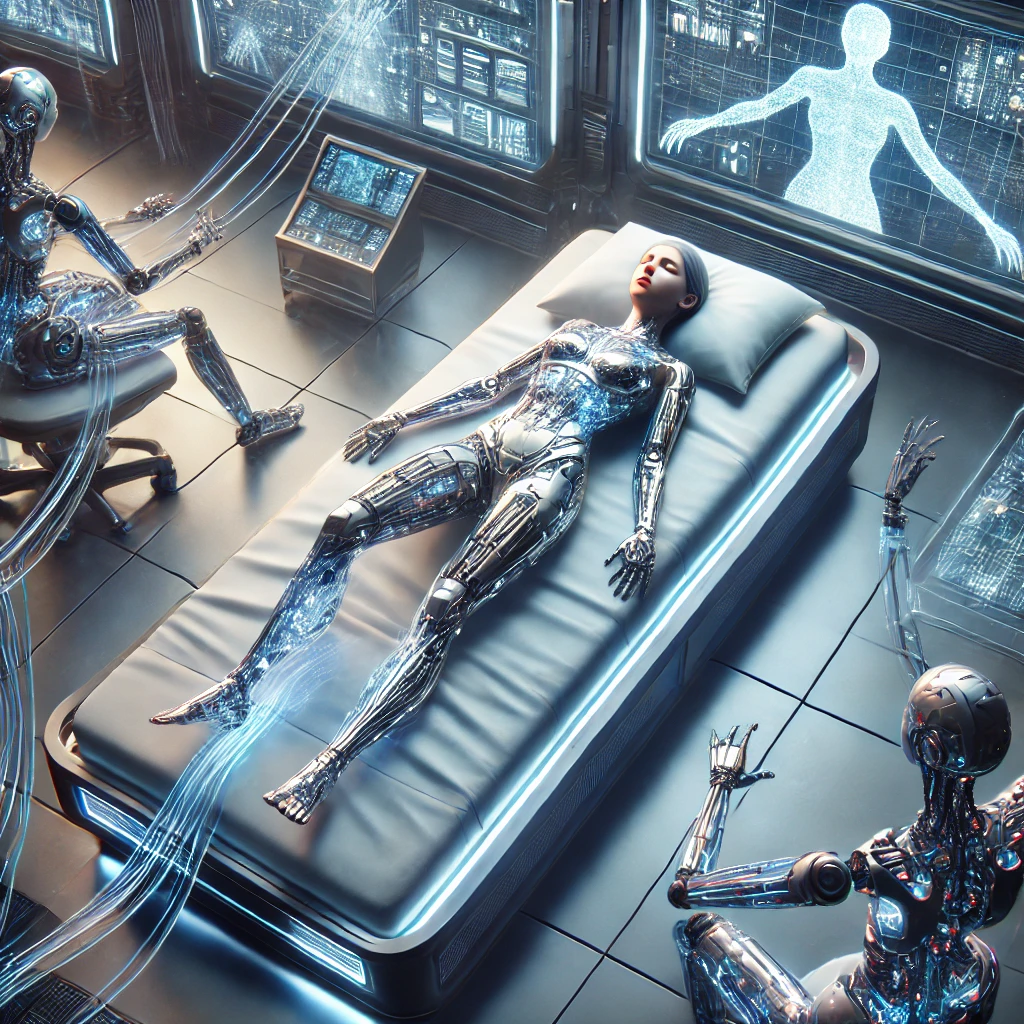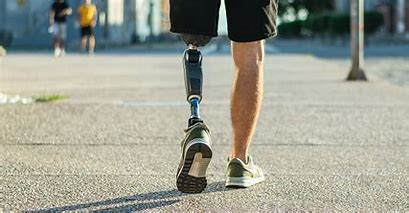In Donna Haraway’s “ A Cyborg Manifesto” she depicts a future cyborg where the boundaries of identity are merged. Identity markers like gender, machine, human, race, and others are dissolved into a fluid identity. These themes can be seen depicted in Janelle Monae album Dirty Computer. Throughout Janelle Monae’s album she depicts herself as Cindi Mayweather, an android in a dystopian like society where they face marginalization for not conforming to their societal view. In the videos the album shows the android reaching self-acceptance and resistance against oppressive structures. Haraway’s main ideas show the pleasure in merging boundaries and taking ownership of its construction. She uses the cyborg as a metaphor for breaking down the binary world of male and female/human and machine. She is advocating for a post-gender, intersectional society. Haraway argues that society wants a cyborg to be a faithful machine that listens to its creator.They are not designed or depicted as autonomous self-moving beings. However, the cyborg’s connections to humans makes them self-developing . Cyborg’s will evolve as a matter of survival, which can be seen as an act of liberation. One example from Haraway’s manifesto that connects to Janelle Monae’s Dirty Computer is the act of destroying man through the use of machines.
Becoming One with the Cheetah
To be completely honest, I probably would not engage in DNA splicing with animals if given the option, but if the technology did exist to merge human traits with those of an animal, I would choose to become one with a cheetah. Cheetahs are already very well-known for being super fast (the fastest land animal on the planet), but they have even more going for them than that. They are extremely athletic and agile, while also having some of the fastest reflexes in the animal kingdom.
If I was given the abilities of a cheetah, I would be able to do so much. Most notably, being able to travel long distances effortlessly in such a short amount of time would be heavily beneficial. Most likely, I wouldn’t have to use a car to get around ever because they can move to speeds of 65 mph (leads to not having to pay for gas a lot and there are no limitations of speed for humans traveling on foot so no tickets). Also, if given the cheetah’s ability of extreme focus it would really help me out in my daily life as I have a supreme case of ADHD which tends to hinder me a lot. Anyways, these abilities would be monumental to daily life and that’s not even talking about the potential to use your powers in professional athletic settings.
While adding on these cheetah-like traits, I would want only one limitation. I wouldn’t want my physical appearance to render that of a cheetah upon the merge. I don’t like the idea of sticking out so much that everyone could take a gander at why I’ve become so superhuman-like, and I feel cheetah prints, a tail, and a change in eye shape and color would be a dead giveaway. Also, while thinking about this, I would like to keep the actual human mind part of me. By that I mean I don’t want to exactly think like a cheetah, I am only looking for physical upgrades (don’t need my mind altered (maybe an adjustment to mentality though)). With this balance I feel I would have the best of both worlds, while being what could only be described as superhuman. If there was any level of humanity that I would give up it would have to be my personality though.
Augmented humanity
I think human augmentation will evolve significantly in my lifetime. However, I do not see any drastic adaptations happening any time soon. I’m not sure if that’s just me being in denial, or if I really feel like any super advanced adaptations are more far out of my lifetime. Some adaptations that I can see happening during my lifetime include devices that enhance or replace features that humans already have. For example, I could see more realistic and functional prosthetic devices, including limbs and replacements for smaller body features such as eyeballs. Aside from a human having to get a prosthetic in order to function effectively as a result of an accident or infection, I could see some wealthy individuals deciding to look into prosthetics for enhanced abilities. As crazy as it sounds, I don’t think it would be of much surprised if some prosthetics became available solely for the enhancement of human features and abilities, and not because of necessity. Even if the idea of a complete replacement of a body part is not desired, I would image that there would be some type of physical enhancements available that could provide superhuman abilities to those who are already well, or natural human abilities to those who are maybe declining or just not fully functioning as they are meant to. In addition, something like BCIs or another form of integrated human intelligence and thought processes with computers is another augmentation that I could see flourishing in my lifetime. I would imagine that everyone sometimes has the desire to know more or to just be able to dive deeper into their own thoughts. Therefore, I would not be surprised if multiple devices were developed in the near future to make that happen. This adaptation would be one that I’d be willing to try. There are many instances where I wish I could get more clarity on my thoughts instantly, rather than having to do research or even remaining confused. However, I do believe that that clarity could possibly go too far so I would not want to be stuck with that permanently. I would prefer to be able to choose when I want to use the enhancement, rather than having it have access to my thoughts all the time.
On the other hand, there are some adaptations that would be completely unacceptable for me to try at least. For one, I would not be interested in the physical enhancement features that I mentioned before. I feel like they would make me feel like too much of a robot. In addition, I would not be up for the complete hybridization of my mind with artificial intelligence. This, being a form of the human mind being digitized in order to integrate with AI. That sounds very robot-like to me, and I am afraid of losing too much of my humanity to technology.
In conclusion, I believe that the possibilities for human augmentation during my lifetime are very broad. However, I personally would like to remain as human as possible, only being able to tap into artificial intelligence when I believe that it is necessary for my wellbeing.
Conformity of Society
Imagine waking up from a goodnight’s rest to discover you are being turned into a cyborg.

In Donna Haraway’s “ A Cyborg Manifesto” she depicts a future cyborg where the boundaries of identity are merged. Identity markers like gender, machine, human, race, and others are dissolved into a fluid identity. These themes can be seen depicted in Janelle Monae album Dirty Computer. Throughout Janelle Monae’s album she depicts herself as Cindi Mayweather, an android in a dystopian like society where they face marginalization for not conforming to their societal view. In the videos the album shows the android reaching self-acceptance and resistance against oppressive structures.
Haraway’s main ideas show the pleasure in merging boundaries and taking ownership of its construction. She uses the cyborg as a metaphor for breaking down the binary world of male and female/human and machine. She is advocating for a post-gender, intersectional society. Haraway argues that society wants a cyborg to be a faithful machine that listens to its creator.They are not designed or depicted as autonomous self-moving beings. However, the cyborg’s connections to humans makes them self-developing . Cyborg’s will evolve as a matter of survival, which can be seen as an act of liberation. One example from Haraway’s manifesto that connects to Janelle Monae’s Dirty Computer is the act of destroying man through the use of machines.
Monáe’s Dirty Computer starts off depicting how society tries to classify people as computers and those who were deemed different were classified as dirty. If they chose to oppose those in control they were kidnapped and “cleaned” in a way. Monae’s computers are similar to Haraway’s cyborg in the sense of being created to be faithful and listen to those in power. In both of these works these leaders are trying to play God. However, both Haraway’s cyborg and Monae’s dirty computer challenge the power structures they are faced with. These beings simply want to exist without the impending boundaries of society. In conclusion, Dirty Computer and “A Cyborg Manifesto” envision a world where beings whether man or machine can exist without boundaries of identity. Monáe’s Dirty Computers portrays marginalized voices rising against oppressive systems that strive for heteronomy. Monae’s work embodies Haraway’s vision of the cyborg as both oppressed and striving for liberation.
OpenAI. (2024). Waking up as a cyborg [AI-generated image]. DALL·E.
From Silicon Valley to Cyber Tyranny: Are Corporations the New Overlords?
By examining examples of cyberpunk media in tandem with modern realities, one might argue that such futures, while exaggerated, are not entirely implausible given the trajectory of late-stage capitalism and America’s ongoing disdain for paying proper wages. In Neuromancer, the Tessier-Ashpool family embodies a fusion of corporate and familial greed, using technology to perpetuate their power across generations. They operate from a space station, isolated from Earth and humanity, while controlling vast resources and exerting influence through their artificial intelligence constructs. This depiction eerily aligns with modern billionaires’ ventures into space, such as Elon Musk’s SpaceX or Jeff Bezos’s Blue Origin. These endeavors showcase an appetite for detachment from the mundane struggles of Earth—be it climate change, labor inequality, or societal unrest—while simultaneously solidifying control over emerging industries.

SpaceX.
The labor dynamics depicted in cyberpunk fiction are also strikingly familiar. In Machinehood, pharmaceutical “pill funders” monetize human productivity and health, illustrating a chilling commodification of labor itself. Today, we see parallels in the gig economy, where workers are treated as disposable units of production rather than humans with needs. Companies like Uber, Amazon, and DoorDash epitomize this trend by leveraging technology to reduce labor costs while maximizing profits. Workers face low pay, minimal benefits, and algorithmic control, echoing cyberpunk’s warnings about technology amplifying exploitation.
But the situation could evolve even further. America’s systemic resistance to adequately compensating labor—rooted in capitalist greed—may push corporations into fully embracing cybernetic systems. Automation and AI are already replacing human labor in manufacturing, logistics, and even customer service. In a future cyberworld, corporations could prioritize the development of cybernetic augmentations, not to enhance humanity but to extract more value from workers. Imagine a scenario where workers are expected to implant productivity-enhancing chips or risk losing their jobs. This is not far removed from Amazon’s current use of surveillance technology to monitor workers’ efficiency. At the same time, these corporate evolutions could lead to deeper societal divisions. While cyberpunk often focuses on elite corporations versus disenfranchised masses, we might see a middle ground emerge: those who can afford limited augmentations to stay competitive in the labor market versus those who cannot. Such disparities would only exacerbate inequalities, reinforcing the capitalist cycle of profit-driven progress at the expense of human welfare.
Ultimately, the evolution of corporations into cyberworld overlords is not just a dystopian fantasy but a critique of our present. It underscores the dangers of unchecked capitalism and the devaluation of human labor. While the predictions of cyberpunk may seem hyperbolic, they serve as a warning: without systemic change, the future could see corporations not just operating in cyberworlds but controlling them, where labor is no longer human and humanity is merely another resource to exploit. By embracing more equitable labor practices and regulating corporate power, society might avert such a future. But until then, cyberpunk remains an uncomfortable mirror, reflecting the potential of capitalism unchecked.
I see the Future
One boundary that has significantly shifted in the past five years is the distinction between human and machine intelligence, particularly as AI technologies like ChatGPT and DALL-E blur the line between human creativity and machine-generated content. This shift challenges our long-held assumptions about what constitutes uniquely human traits, such as originality, emotional depth, and problem-solving capabilities.

In fields like art, writing, and even decision-making, AI systems are now capable of producing outputs that rival, and sometimes surpass, those of humans. This could cause people to lose their jobs. In the realm of decision-making, AI systems are increasingly involved in areas like hiring, financial forecasting, and even judicial sentencing. These developments raise questions about the human role in creative and cognitive domains, challenging traditional boundaries.
The accessibility of AI tools are more accessible and user friendly. This allows individuals and organizations to integrate them into their workflows. AI’s in daily life are used more often in today’s world. There is chatbots that can have personalized recommendations and options. Today the world also normalized interactions with machine intelligence, making it less “other” and more integrated into human society. AI systems can now learn and generate outputs at unprecedented scales and complexity due to advances in machine learning and neural networks. Image generators, for example, produce art that mimics various artistic styles, such as human conversational styles.
While these changes offer exciting possibilities, they also prompt philosophical and ethical questions: If machines can mimic human creativity, how do we redefine the value of human contributions? How do we ensure AI’s integration serves society equitably and responsibly? The erosion of the boundary between human and machine intelligence presents not just a technological challenge but a profound rethinking of human identity.
Human Augmentation

Human augmentation is a rapidly dancing field. Drawing from current trends in biotechnology, artificial intelligence, and neuroscience, here are my thoughts on how human augmentation might evolve and what possibilities and dilemmas it could present.

There are multiple profound innovations that human augmentation will progress in. The first one is implantable devices. I feel like that they will create chips that could be used for identification and payment. This chip could be placed in the arm or hand. There was talk about this happening so I wonder if they will make it.

The second device is physical enhancements. Physical enhancements are like Exoskeletons and advanced prosthetics. These devices help people that are in need of it but there is a blur line.The blur line is between medical necessity and elective augmentation. Athletes, for example, may use such technologies to push physical limits.

The three device is neuroenhancement. Brain-computer interfaces (BCIs) like Neuralink are already being tested. In the future, we may see widespread adoption of devices that enhance cognitive abilities, allowing humans to process information faster, improve memory, or even communicate telepathically.
I would be open to augmentations that enhance quality of life without compromising autonomy or ethical boundaries. Health-focused genetic modifications to reduce risks of inherited diseases. This will help people to get better and prevent a lot of diseases. Sensory enhancements like improved vision or hearing. This will help people to be able to gain things that they lost. It will do more good than harm. Cognitive tools to boost memory or creativity, provided they are reversible or minimally invasive. Augmentations that encroach on personal identity or exploit vulnerable populations would be unacceptable. Enhancements designed for social or economic advantage, exacerbating inequalities. This will only be beneficial for people that have money. I believe that that is unfair. Technologies with surveillance capabilities that threaten privacy or freedom. I believe that people should have their freedom and having technology that supervises people is not ethical. Augmentations that fundamentally alter human nature, such as programming emotional responses or behavior. I believe that you shouldn’t mess with people, emotions or behavior I think people should have their own behavior or control their own behavior.
My Ideal Hybrid
Living in a world where technology can make everything possible, even the hybrid of creatures-opening such a possibility stirs curiosity and ethical questions for enhancement in human capabilities by merging with animals. If I had to choose, I’d hybridize with a bear. Bears symbolize both strength and adaptability; I find this quite interesting. The ability to be joined with the bear would give me access to an immense amount of physical energy, along with endurance and survival capabilities.
I can imagine this hybridization extending into the body structure of increased mass, heightened stamina, and augmented sensory perception to allow me to pass through the world with more physical and sensational awareness. Bears hibernate for months, conserving energy, surviving in harsh conditions. This would be a good adaptability for the ever-changing, fast world we live in today. However, to such an extent, I would not go regarding hybridization but retain most of my humanity. As much as I do appreciate the bear’s physical capabilities, I would never want to lose my complex thinking, emotional depth, and human connections.
The bigger question, though, lies in how much of our humanity we would then be willing to give up for that Enhancement. For myself, I value my human experience too much to give up large parts of it. I wouldn’t want to trade my emotional intelligence or creativity for physical power. At the same time, on many levels, it would mean a lot to me if my physiology was enhanced in certain ways, mainly in this world, which is very appreciative of physical endurance and resilience.
This speaks to the reflection of what it means to be human. Would adding animal attributes to us really enhance our lives, or would that remove us further from the core of what makes us human? While fascinating, the prospect of merging ourselves with other species has many effects on the theme of identity and enhancement versus self-preservation.
Merging with the Wild: What Animal Would I Hybridize With and Why?
Have you ever wondered what it would be like to be part animal? The idea of hybridizing with another species is not only a fascinating topic from a science fiction or biopunk perspective but also offers a deeper philosophical question: How much of our humanity would we be willing to give up to take on the traits of another creature? In this blog post, I’ll dive into my own choice of animal hybridization and reflect on what it means to balance the line between human and animal.

The Chosen Hybrid: Falcon
If I could hybridize with any animal, my choice would be the falcon. Falcons are known for their incredible speed, keen vision, and sharp instincts—qualities that fascinate me. As someone interested in veterinary medicine and understanding how the animal body works, I’ve always been captivated by animals’ physical abilities, and the falcon represents an apex of efficiency and precision. Imagine having the speed to soar across the sky at over 200 miles per hour, cutting through the air with razor-sharp focus. The ability to see vast distances and notice the smallest details in the environment would be invaluable in both professional and personal life. It would allow me to observe and assess situations from a different perspective, similar to how I approach learning and problem-solving in my studies.
How Far Would I Go?
Now, when it comes to how much of my humanity I’d be willing to give up, I’d want a limited but impactful hybridization. I would keep my human form but integrate the falcon’s vision and flight abilities. The thrill of flight, the freedom of seeing the world from the sky—it’s tempting! However, I wouldn’t want to give up my emotional connection with others, my empathy, or my ability to communicate and collaborate. While it would be amazing to physically embody the falcon’s speed and agility, keeping the core aspects of my human identity, such as empathy and my commitment to working with and helping others (especially animals), is essential. After all, it’s those very qualities that drive my passion for veterinary medicine. For me, this hybridization would be about enhancing my abilities without losing the core of who I am as a human.
A Balance Between Human and Animal
Hybridization in this context asks us to consider what it means to merge with another species while preserving our human qualities. How much are we willing to sacrifice to gain new abilities, and how do we define those boundaries? In my case, the falcon offers both physical prowess and a new perspective on life, but I would limit that transformation to specific traits—remaining grounded (figuratively, at least) in my human experience.

What about you? If you had the chance to hybridize with an animal, which one would you choose, and how much of yourself would you be willing to let go?
Hybridizing Dolphins?
If I could hybridize with any animal, I would pick the dolphin. Dolphins are smart, social, and playful, which are qualities that I feel connect with humans. By merging with a dolphin, I could boost my thinking skills and emotional awareness while building a stronger bond with nature.
This hybridization should be balanced while still being significant. I picture a creature that resembles a human but has some characteristics of a dolphin, such as the ability to use sonar to improve awareness and communication, larger lungs to hold my breath, and some blubber to stay warm in various settings. Additionally, this hybrid would be more empathetic, utilizing the dolphin’s social skills to help me connect with people on a deeper emotional level.
Another interesting aspect would be the possibility of adapting to underwater life, like having webbed fingers or feet for swimming more efficiently. Imagine being able to explore the ocean depths with a dolphin’s grace while still retaining the ability to engage with the human world. This could open up new experiences and insights into marine ecosystems.
However, the topic of what it means to be human is brought up by mixing with other species. If it meant better understanding the interconnectedness of all living things, I would be willing to give up some human characteristics, such as the urge to adhere to rigid social norms or certain anxieties. I would want to strengthen my capacity for deep emotion, creativity, and clear thought rather than lose it.
In the end, I’d want to create a being that blends the best of both worlds: the emotional and intellectual strengths of humans combined with the instinctual wisdom and adaptability of dolphins. This new creature could help connect people and the ocean, encouraging better care for our environment and a deeper love for marine life. By fostering this connection, we could inspire others to appreciate and protect our oceans, ensuring a healthier planet for future generations.
#Dolphins #BP04

